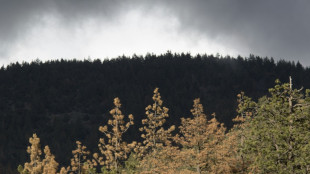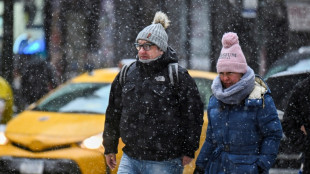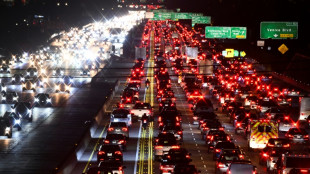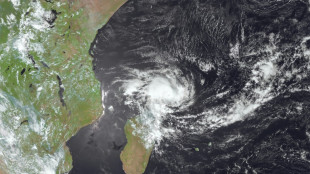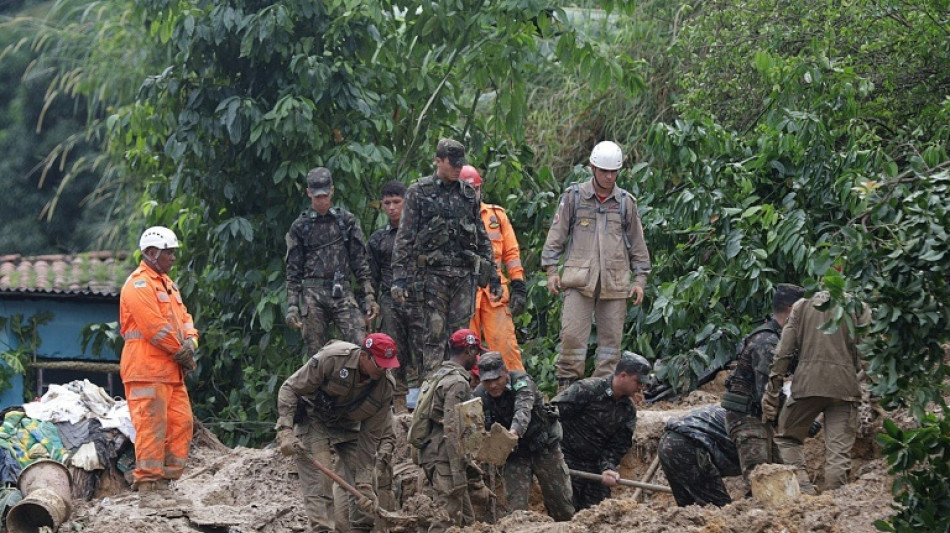

Bolsonaro visits disaster zone after deadly Brazil rains
President Jair Bolsonaro sent his condolences Monday to the families of 91 people who died in torrential rains in northeastern Brazil, as rescue workers continued a grim search for victims.
Releasing an updated toll, authorities said 26 people remained missing in the region around the city of Recife, where days of downpours triggered flooding and landslides that swept up virtually everything in their path.
Bolsonaro posted a video on Twitter that showed him flying in a helicopter over a disaster zone where brown floodwater still inundated large areas and gashes of mud scarred hillsides where houses once stood.
"I tried to land, but the pilots' recommendation was that, given the instability of the soil, we could have an accident. So we decided against it," the far-right president told a news conference.
He recalled a string of devastating floods in Brazil that have killed hundreds of people in recent months, which experts say are being aggravated by climate change.
"We send our condolences to the families. Our top priority is comforting the families and getting aid to the population," he said.
The government has allocated a total of one billion reais ($210 million) in emergency and reconstruction funds, said Regional Development Minister Daniel Ferreira.
"The forecast is for more rain in the coming days. We urge people to respect the alerts issued by the authorities" and evacuate if necessary, the minister added.
The risk of floods in and around Recife, the capital of Pernambuco state, remains "very high" for Monday, said the national disaster monitoring center, Cemaden.
- Ocean of muck -
The force of the landslides ripped apart houses in neighborhoods such as Jardim Monteverde, on the far outskirts of Recife.
Rescue workers have found more than 20 bodies buried in the mud that tore through the neighborhood Saturday, and said they expect to find more.
Dozens of emergency workers are still digging through the ocean of muck, as clean-up crews in yellow uniforms clear the streets, slowly working their way through the wreckage, an AFP photographer said.
In just hours on Friday and Saturday, parts of Pernambuco received 70 percent of the rain they usually get in the entire month of May.
Such tragedies are becoming a familiar script in Brazil.
In February, 233 people were killed in floods and landslides in the southeastern city of Petropolis, in Rio de Janeiro state.
In January, floods and landslides killed at least 28 people in southeastern Brazil, mostly in Sao Paulo state.
And in December, torrential rains killed 24 people in the northeastern state of Bahia.
On that occasion, Bolsonaro -- who is trailing leftist ex-president Luiz Inacio Lula da Silva in the polls ahead of elections in October -- faced criticism for not interrupting his year-end beach vacation to visit the disaster zone.
"Unfortunately these tragedies happen, a country the size of a continent has its share of problems," Bolsonaro said Monday.
Meteorologists say the heavy rains lashing Pernambuco and, to a lesser extent, four other northeastern states are the product of a typical seasonal phenomenon called "eastern waves" -- areas of atmospheric disturbance that move from Africa to Brazil's northeastern coastal region.
Experts say the rains are now being augmented by climate change. Because a hotter atmosphere holds more water, global warming increases the risk and intensity of flooding from extreme rainfall.
In Brazil, such tragedies have tended to hit hardest in poor neighborhoods, especially hillside "favelas," or slums.
J.Fletcher--NG
